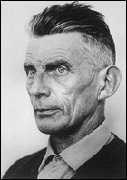JAMES
JOYCE(1882-1941)

Joyce
was born at 41 Brighton Square, Rathgar, Dublin,on 2 February 1882. His
father invested unwisely, and the family's fortunes declined steadily.
Joyce graduated from University College, Dublin, in 1902; he briefly studied
medicine in Paris, but his mother's impending death brought him back to
Dublin.
In 1904, Joyce began Stephen Hero, which he later re-worked as A Portrait
of the Artist as a Young Man. He also met Nora Barnacle, a chambermaid,
and on 16 June 1904 they went walking at Ringsend, at the Liffey's mouth;
Joyce later chose that date for the events recorded in Ulysses. Having
briefly shared a Martello tower at Sandycove, Co Dublin, with Oliver StJohn
Gogarty, he sailed from Dublin with Nora in October 1904. Joyce found
work in a language school in Trieste. In 1909, he made two trips to Dublin,
to arrange publication of Dubliners, and to open a short-lived cinema.
His last visit was in 1912, when he failed to overcome his publisher's
doubts about Dubliners. In 1914 the book was published in England, and
A Portrait was serialised in a London magazine.
With the outbreak of World War I, Joyce moved to Zurich in neutral Switzerland,
where in 1917 he underwent the first of many operations for glaucoma.
Ulysses, his masterpiece, was serialised in New York in 1918-20, but was
eventually halted by a court action.
Joyce returned to Trieste in 1919, then moved to Paris, where in 1922
Ulysses was published by Sylvia Beach, owner of a celebrated bookshop.
Its portrait of Dublin, and of the Jewish advertisement canvasser Leopold
Bloom, revolutionised the novel with its 'stream of consciousness' technique;
it was not published in Britain until 1936. In 1923, Joyce began the almost
impenetrable Finnegans Wake, which was published in 1939. Joyce and Nora
finally married in 1931, and in 1940 returned to Zurich, where he died
on 13 January 1941.
OSCAR WILDE(1854-1900)

Oscar
Fingal O'Flahertie Wills Wilde was born at 21 Westland Row, Dublin,
on 16 October 1854.
His father was an eminent eye and ear specialist; his mother wrote under
the pen-name 'Speranza'. They soon moved to 1 Merrion Square, where Oscar
was allowed to frequent his mother's salon.
Wilde defeated Edward Carson for the foundation scholarship in classics
at Trinity College, Dublin, and in 1874 won a scholarship to Magdalen
College, Oxford, where he was influenced by John Ruskin, Walter Pater
and Cardinal Newman. He became a disciple of aestheticism, pursuing beauty
for beauty's sake; his poem Ravenna (1878) won the Newdigate Prize.
Wilde's wit and eccentric dress attracted attention, and in 1882 he undertook
a lecture tour in America, advising a customs officer that he had 'nothing
to declare but my genius'. In 1884, he married Constance Lloyd, a barrister's
daughter, and embarked on a literary career. His first success was The
Happy Prince (1888), but his novel The Picture of Dorian Gray (1891) offended
Victorian susceptibilities.
The triumph of his play Lady Windermere's Fan (1892) inaugurated his most
glorious years. It was followed by A Woman of No Importance (1893), An
Ideal Husband (1895) and The Importance of Being Earnest (1895).
SAMUEL BECKETT (1906-1989)
 Beckett
was born on April 13, 1906, near Dublin, Ireland. He grew up
in a middle class, Protestant home, the son of a quantity surveyor and
a nurse, he was sent off at the age of 14 to go to the same school regularly
which Oscar Wilde had gone. Looking back on his childhood, he once remarked,
"I had little talent for happiness."
Beckett
was born on April 13, 1906, near Dublin, Ireland. He grew up
in a middle class, Protestant home, the son of a quantity surveyor and
a nurse, he was sent off at the age of 14 to go to the same school regularly
which Oscar Wilde had gone. Looking back on his childhood, he once remarked,
"I had little talent for happiness."
Beckett made his way
through Ireland, France, England, and Germany, all the while writing poems
and stories and doing estrange jobs to get by. In the course of his journies,
he no doubt came into contact with many tramps and wanderers, and these
friends would later translate into some of his finest characters. Whenever
he happened to pass through Paris, he would call on Joyce, and they would
have long visits, although it was rumored that they mostly sit in silence,
both suffused with sadness.
Beckett
finally estabilished down in Paris in 1937.
Beckett
secured his position as a master dramatist on April 3, 1957 when his second
masterpiece, Endgame, premiered (in French) at the Royal Court
Theatre in London. Although English was his native language, all of Beckett's
major works were originally written in French. Apparently, however, he
wanted the discipline and economy of expression that an acquired language
would force upon on him.
Beckett
was the first of the absurdists to win international fame. His works have
been translated into over twenty languages. In 1969 he was awarded the
Nobel Prize for Literature. He continued to write until his death in 1989,
but the task grew more and more difficult with each work until, in the
end, he said that each word seemed to him "an unnecessary stain on
silence and nothingness."
- When was Oscar Wilde born?
- What are his most famous books?
- What’s the address of James Joyce’s
house? Can you visit it?
- Waht's the name of the protagonist
of Ulysses?
- Can you name any of the works
of Samuel Beckett?